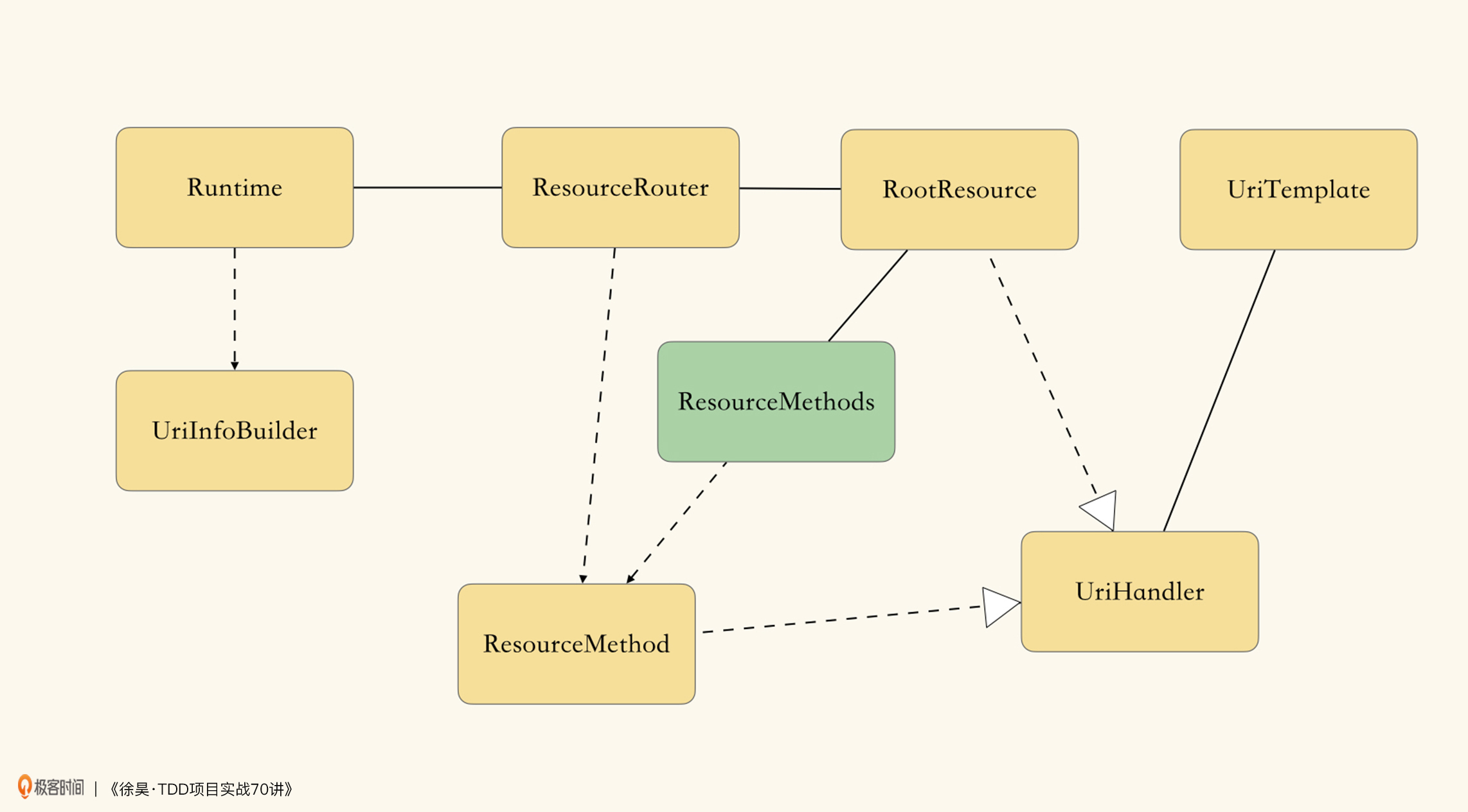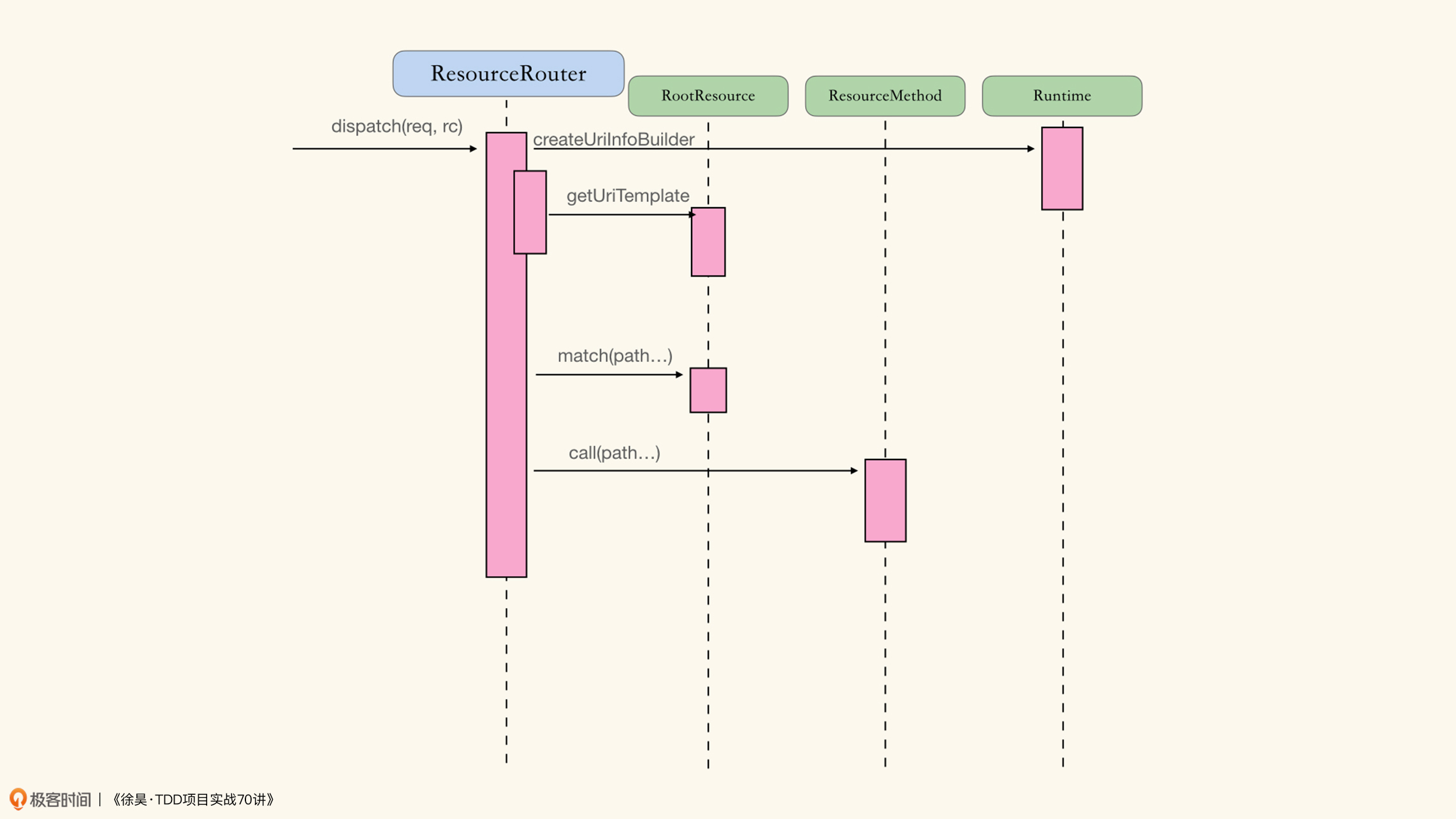74|RESTful Web Services(38):如何提取方法调用部分?
徐昊

你好,我是徐昊。今天我们继续使用 TDD 的方式实现 RESTful Web Services。
回顾架构愿景与任务列表


目前的任务列表:
Resource/RootResource/ResourceMethods
当 HEAD 方法映射到 GET 方法时,忽略 GET 的返回值
当没有 OPTIONS 方法时,提供默认实现
代码为:
package geektime.tdd.rest;
import jakarta.servlet.http.HttpServletRequest;
import jakarta.ws.rs.HttpMethod;
import jakarta.ws.rs.Path;
import jakarta.ws.rs.PathParam;
import jakarta.ws.rs.QueryParam;
import jakarta.ws.rs.container.ResourceContext;
import jakarta.ws.rs.core.GenericEntity;
import jakarta.ws.rs.core.HttpHeaders;
import jakarta.ws.rs.core.Response;
import jakarta.ws.rs.core.UriInfo;
import java.lang.reflect.InvocationTargetException;
import java.lang.reflect.Method;
import java.lang.reflect.Parameter;
import java.lang.reflect.Type;
import java.util.*;
import java.util.function.Function;
import java.util.stream.Collectors;
import static geektime.tdd.rest.DefaultResourceMethod.ValueConverter.singeValued;
import static java.util.Arrays.stream;
interface ResourceRouter {
OutboundResponse dispatch(HttpServletRequest request, ResourceContext resourceContext);
interface Resource extends UriHandler {
Optional<ResourceMethod> match(UriTemplate.MatchResult result, String httpMethod, String[] mediaTypes, ResourceContext resourceContext, UriInfoBuilder builder);
}
interface ResourceMethod extends UriHandler {
String getHttpMethod();
GenericEntity<?> call(ResourceContext resourceContext, UriInfoBuilder builder);
}
}
class DefaultResourceRouter implements ResourceRouter {
private Runtime runtime;
private List<Resource> rootResources;
public DefaultResourceRouter(Runtime runtime, List<Resource> rootResources) {
this.runtime = runtime;
this.rootResources = rootResources;
}
@Override
public OutboundResponse dispatch(HttpServletRequest request, ResourceContext resourceContext) {
String path = request.getServletPath();
UriInfoBuilder uri = runtime.createUriInfoBuilder(request);
Optional<ResourceMethod> method = UriHandlers.mapMatched(path, rootResources, (result, resource) -> findResourceMethod(request, resourceContext, uri, result, resource));
if (method.isEmpty()) return (OutboundResponse) Response.status(Response.Status.NOT_FOUND).build();
return (OutboundResponse) method.map(m -> m.call(resourceContext, uri))
.map(entity -> (entity.getEntity() instanceof OutboundResponse) ? (OutboundResponse) entity.getEntity() : Response.ok(entity).build())
.orElseGet(() -> Response.noContent().build());
}
private Optional<ResourceMethod> findResourceMethod(HttpServletRequest request, ResourceContext resourceContext, UriInfoBuilder uri, Optional<UriTemplate.MatchResult> matched, Resource handler) {
return handler.match(matched.get(), request.getMethod(),
Collections.list(request.getHeaders(HttpHeaders.ACCEPT)).toArray(String[]::new), resourceContext, uri);
}
}
class DefaultResourceMethod implements ResourceRouter.ResourceMethod {
private String httpMethod;
private UriTemplate uriTemplate;
private Method method;
public DefaultResourceMethod(Method method) {
this.method = method;
this.uriTemplate = new PathTemplate(Optional.ofNullable(method.getAnnotation(Path.class)).map(Path::value).orElse(""));
this.httpMethod = stream(method.getAnnotations()).filter(a -> a.annotationType().isAnnotationPresent(HttpMethod.class))
.findFirst().get().annotationType().getAnnotation(HttpMethod.class).value();
}
@Override
public String getHttpMethod() {
return httpMethod;
}
@Override
public UriTemplate getUriTemplate() {
return uriTemplate;
}
@Override
public GenericEntity<?> call(ResourceContext resourceContext, UriInfoBuilder builder) {
try {
UriInfo uriInfo = builder.createUriInfo();
Object result = method.invoke(builder.getLastMatchedResource(),
stream(method.getParameters()).map(parameter ->
injectParameter(parameter, uriInfo)
.or(() -> injectContext(parameter, resourceContext, uriInfo))
.orElse(null)).toArray(Object[]::new));
return result != null ? new GenericEntity<>(result, method.getGenericReturnType()) : null;
} catch (IllegalAccessException | InvocationTargetException e) {
throw new RuntimeException(e);
}
}
private Optional<Object> injectParameter(Parameter parameter, UriInfo uriInfo) {
return providers.stream().map(provider -> provider.provide(parameter, uriInfo)).filter(Optional::isPresent)
.findFirst()
.flatMap(values -> values.flatMap(v -> convert(parameter, v)));
}
private Optional<Object> injectContext(Parameter parameter, ResourceContext resourceContext, UriInfo uriInfo) {
if (parameter.getType().equals(ResourceContext.class)) return Optional.of(resourceContext);
if (parameter.getType().equals(UriInfo.class)) return Optional.of(uriInfo);
return Optional.of(resourceContext.getResource(parameter.getType()));
}
private Optional<Object> convert(Parameter parameter, List<String> values) {
return PrimitiveConverter.convert(parameter, values)
.or(() -> ConverterConstructor.convert(parameter.getType(), values.get(0)))
.or(() -> ConverterFactory.convert(parameter.getType(), values.get(0)));
}
private static ValueProvider pathParam = (parameter, uriInfo) ->
Optional.ofNullable(parameter.getAnnotation(PathParam.class))
.map(annotation -> uriInfo.getPathParameters().get(annotation.value()));
private static ValueProvider queryParam = (parameter, uriInfo) ->
Optional.ofNullable(parameter.getAnnotation(QueryParam.class))
.map(annotation -> uriInfo.getQueryParameters().get(annotation.value()));
private static List<ValueProvider> providers = List.of(pathParam, queryParam);
interface ValueProvider {
Optional<List<String>> provide(Parameter parameter, UriInfo uriInfo);
}
interface ValueConverter<T> {
T fromString(List<String> values);
static <T> ValueConverter<T> singeValued(Function<String, T> converter) {
return values -> converter.apply(values.get(0));
}
}
@Override
public String toString() {
return method.getDeclaringClass().getSimpleName() + "." + method.getName();
}
}
class PrimitiveConverter {
private static Map<Type, DefaultResourceMethod.ValueConverter<Object>> primitives = Map.of(
int.class, singeValued(Integer::parseInt),
double.class, singeValued(Double::parseDouble),
short.class, singeValued(Short::parseShort),
float.class, singeValued(Float::parseFloat),
byte.class, singeValued(Byte::parseByte),
boolean.class, singeValued(Boolean::parseBoolean),
String.class, singeValued(s -> s));
public static Optional<Object> convert(Parameter parameter, List<String> values) {
return Optional.ofNullable(primitives.get(parameter.getType()))
.map(c -> c.fromString(values));
}
}
class ConverterConstructor {
public static Optional<Object> convert(Class<?> converter, String value) {
try {
return Optional.of(converter.getConstructor(String.class).newInstance(value));
} catch (InstantiationException | IllegalAccessException | InvocationTargetException |
NoSuchMethodException e) {
return Optional.empty();
}
}
}
class ConverterFactory {
public static Optional<Object> convert(Class<?> converter, String value) {
try {
return Optional.of(converter.getMethod("valueOf", String.class).invoke(null, value));
} catch (IllegalAccessException | InvocationTargetException | NoSuchMethodException e) {
return Optional.empty();
}
}
}
class ResourceMethods {
private Map<String, List<ResourceRouter.ResourceMethod>> resourceMethods;
public ResourceMethods(Method[] methods) {
this.resourceMethods = getResourceMethods(methods);
}
private static Map<String, List<ResourceRouter.ResourceMethod>> getResourceMethods(Method[] methods) {
return stream(methods).filter(m -> stream(m.getAnnotations())
.anyMatch(a -> a.annotationType().isAnnotationPresent(HttpMethod.class)))
.map(DefaultResourceMethod::new)
.collect(Collectors.groupingBy(ResourceRouter.ResourceMethod::getHttpMethod));
}
public Optional<ResourceRouter.ResourceMethod> findResourceMethods(String path, String method) {
return findMethod(path, method).or(() -> findAlternative(path, method));
}
private Optional<ResourceRouter.ResourceMethod> findAlternative(String path, String method) {
if (HttpMethod.HEAD.equals(method)) return findMethod(path, HttpMethod.GET).map(HeadResourceMethod::new);
if (HttpMethod.OPTIONS.equals(method)) return Optional.of(new OptionResourceMethod(path));
return Optional.empty();
}
private Optional<ResourceRouter.ResourceMethod> findMethod(String path, String method) {
return Optional.ofNullable(resourceMethods.get(method)).flatMap(methods -> UriHandlers.match(path, methods, r -> r.getRemaining() == null));
}
class OptionResourceMethod implements ResourceRouter.ResourceMethod {
private String path;
public OptionResourceMethod(String path) {
this.path = path;
}
@Override
public String getHttpMethod() {
return HttpMethod.OPTIONS;
}
@Override
public GenericEntity<?> call(ResourceContext resourceContext, UriInfoBuilder builder) {
return new GenericEntity<>(Response.noContent().allow(findAllowedMethods()).build(), Response.class);
}
private Set<String> findAllowedMethods() {
Set<String> allowed = List.of(HttpMethod.GET, HttpMethod.HEAD, HttpMethod.OPTIONS, HttpMethod.PUT,
HttpMethod.POST, HttpMethod.DELETE, HttpMethod.PATCH).stream()
.filter(method -> findMethod(path, method).isPresent()).collect(Collectors.toSet());
allowed.add(HttpMethod.OPTIONS);
if (allowed.contains(HttpMethod.GET)) allowed.add(HttpMethod.HEAD);
return allowed;
}
@Override
public UriTemplate getUriTemplate() {
return new PathTemplate(path);
}
}
}
class HeadResourceMethod implements ResourceRouter.ResourceMethod {
ResourceRouter.ResourceMethod method;
public HeadResourceMethod(ResourceRouter.ResourceMethod method) {
this.method = method;
}
@Override
public String getHttpMethod() {
return HttpMethod.HEAD;
}
@Override
public GenericEntity<?> call(ResourceContext resourceContext, UriInfoBuilder builder) {
method.call(resourceContext, builder);
return null;
}
@Override
public UriTemplate getUriTemplate() {
return method.getUriTemplate();
}
}
class SubResourceLocators {
private final List<ResourceRouter.Resource> subResourceLocators;
public SubResourceLocators(Method[] methods) {
subResourceLocators = stream(methods).filter(m -> m.isAnnotationPresent(Path.class) &&
stream(m.getAnnotations()).noneMatch(a -> a.annotationType().isAnnotationPresent(HttpMethod.class)))
.map((Function<Method, ResourceRouter.Resource>) SubResourceLocator::new).toList();
}
public Optional<ResourceRouter.ResourceMethod> findSubResourceMethods(String path, String method, String[] mediaTypes, ResourceContext resourceContext, UriInfoBuilder builder) {
return UriHandlers.mapMatched(path, subResourceLocators, (result, locator) -> locator.match(result.get(), method, mediaTypes, resourceContext, builder));
}
static class SubResourceLocator implements ResourceRouter.Resource {
private PathTemplate uriTemplate;
private Method method;
public SubResourceLocator(Method method) {
this.method = method;
this.uriTemplate = new PathTemplate(method.getAnnotation(Path.class).value());
}
@Override
public UriTemplate getUriTemplate() {
return uriTemplate;
}
@Override
public String toString() {
return method.getDeclaringClass().getSimpleName() + "." + method.getName();
}
@Override
public Optional<ResourceRouter.ResourceMethod> match(UriTemplate.MatchResult result, String httpMethod, String[] mediaTypes, ResourceContext resourceContext, UriInfoBuilder builder) {
Object resource = builder.getLastMatchedResource();
try {
Object subResource = method.invoke(resource);
return new ResourceHandler(subResource, uriTemplate).match(result, httpMethod, mediaTypes, resourceContext, builder);
} catch (Exception e) {
throw new RuntimeException(e);
}
}
}
}
class ResourceHandler implements ResourceRouter.Resource {
private UriTemplate uriTemplate;
private ResourceMethods resourceMethods;
private SubResourceLocators subResourceLocators;
private Function<ResourceContext, Object> resource;
public ResourceHandler(Class<?> resourceClass) {
this(resourceClass, new PathTemplate(getTemplate(resourceClass)), rc -> rc.getResource(resourceClass));
}
private static String getTemplate(Class<?> resourceClass) {
if (!resourceClass.isAnnotationPresent(Path.class)) throw new IllegalArgumentException();
return resourceClass.getAnnotation(Path.class).value();
}
public ResourceHandler(Object resource, UriTemplate uriTemplate) {
this(resource.getClass(), uriTemplate, rc -> resource);
}
private ResourceHandler(Class<?> resourceClass, UriTemplate uriTemplate, Function<ResourceContext, Object> resource) {
this.uriTemplate = uriTemplate;
this.resourceMethods = new ResourceMethods(resourceClass.getMethods());
this.subResourceLocators = new SubResourceLocators(resourceClass.getMethods());
this.resource = resource;
}
@Override
public Optional<ResourceRouter.ResourceMethod> match(UriTemplate.MatchResult result, String httpMethod, String[] mediaTypes, ResourceContext resourceContext, UriInfoBuilder builder) {
builder.addMatchedResource(resource.apply(resourceContext));
String remaining = Optional.ofNullable(result.getRemaining()).orElse("");
return resourceMethods.findResourceMethods(remaining, httpMethod)
.or(() -> subResourceLocators.findSubResourceMethods(remaining, httpMethod, mediaTypes, resourceContext, builder));
}
@Override
public UriTemplate getUriTemplate() {
return uriTemplate;
}
}
视频演示
进入今天的环节:
00:00 / 00:00
1.0x
- 2.0x
- 1.5x
- 1.25x
- 1.0x
- 0.75x
- 0.5x
音量
网页全屏
全屏
00:00
思考题
如何重构并复用测试?
欢迎把你的思考和想法分享在留言区,咱们下节课再见!
确认放弃笔记?
放弃后所记笔记将不保留。
新功能上线,你的历史笔记已初始化为私密笔记,是否一键批量公开?
批量公开的笔记不会为你同步至部落
公开
同步至部落
取消
完成
0/2000
笔记
复制
AI
- 深入了解
- 翻译
- 英语
- 中文简体
- 中文繁体
- 法语
- 德语
- 日语
- 韩语
- 俄语
- 西班牙语
- 阿拉伯语
- 解释
- 总结

本文介绍了使用TDD的方式实现RESTful Web Services的过程。文章首先回顾了架构愿景与任务列表,其中包括Resource/RootResource/ResourceMethods等任务。接着详细介绍了DefaultResourceRouter和DefaultResourceMethod的实现,包括方法调用部分的提取和处理。在代码实现中,作者使用了一系列接口和类来处理请求的分发和方法的调用,同时也介绍了如何提取方法调用部分,包括参数注入、类型转换等细节。此外,文章还介绍了ResourceMethods和SubResourceLocators的实现,以及如何重构并复用测试的思考题。 总的来说,本文通过代码实现的方式,详细介绍了如何使用TDD的方式来实现RESTful Web Services,并且提供了一些思考题来引导读者深入思考。这篇文章适合对RESTful Web Services感兴趣的技术人员阅读,能够帮助他们了解如何使用TDD的方式来实现该技术,并且提供了一些实际的代码实现细节和思考题来引发读者的思考和讨论。
仅可试看部分内容,如需阅读全部内容,请付费购买文章所属专栏
《徐昊 · TDD 项目实战 70 讲》,新⼈⾸单¥98
《徐昊 · TDD 项目实战 70 讲》,新⼈⾸单¥98
立即购买
登录 后留言
全部留言(1)
- 最新
- 精选
 aoe看到开头想起了姚琪琳老师在微信讨论群中说的一句话: static 说明当前类没有依赖,是一个可以移出去的信号2022-09-04归属地:浙江
aoe看到开头想起了姚琪琳老师在微信讨论群中说的一句话: static 说明当前类没有依赖,是一个可以移出去的信号2022-09-04归属地:浙江
收起评论

